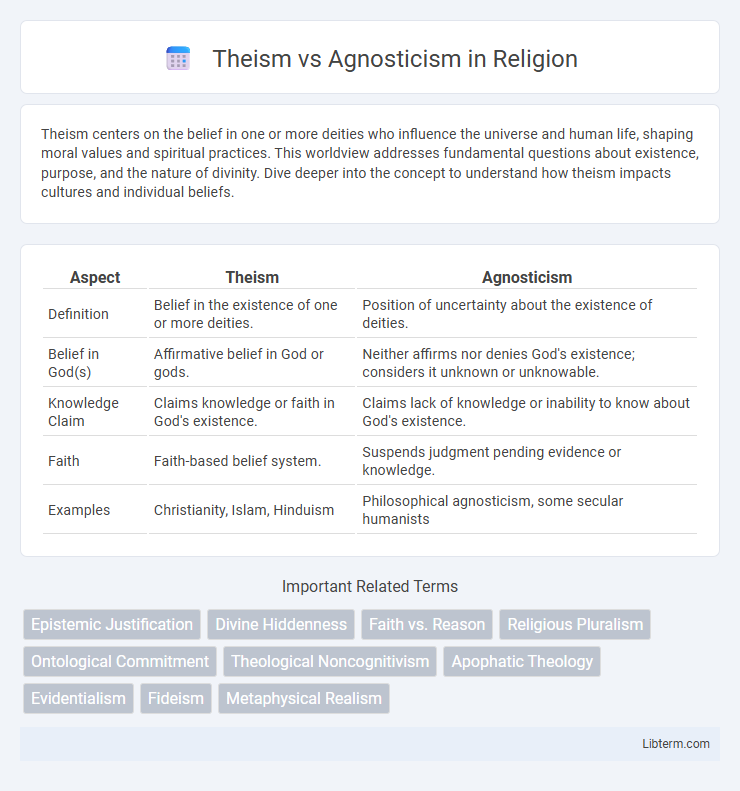Theism centers on the belief in one or more deities who influence the universe and human life, shaping moral values and spiritual practices. This worldview addresses fundamental questions about existence, purpose, and the nature of divinity. Dive deeper into the concept to understand how theism impacts cultures and individual beliefs.
Table of Comparison
| Aspect | Theism | Agnosticism |
|---|---|---|
| Definition | Belief in the existence of one or more deities. | Position of uncertainty about the existence of deities. |
| Belief in God(s) | Affirmative belief in God or gods. | Neither affirms nor denies God's existence; considers it unknown or unknowable. |
| Knowledge Claim | Claims knowledge or faith in God's existence. | Claims lack of knowledge or inability to know about God's existence. |
| Faith | Faith-based belief system. | Suspends judgment pending evidence or knowledge. |
| Examples | Christianity, Islam, Hinduism | Philosophical agnosticism, some secular humanists |
Defining Theism: Core Beliefs and Variations
Theism centers on the belief in one or multiple deities who actively influence the universe, with core doctrines including divine omnipotence, omniscience, and benevolence. Variations of theism range from monotheism, exemplified by Christianity, Islam, and Judaism, to polytheism found in Hinduism and ancient Greek religions. These beliefs encompass differing perspectives on divine intervention, revelation, and the nature of the sacred, shaping diverse theological frameworks across cultures.
What is Agnosticism? Clarifying the Concept
Agnosticism is the philosophical position that the existence or non-existence of deities cannot be known or proven with certainty, emphasizing uncertainty and skepticism regarding divine knowledge. It differs from theism, which asserts belief in one or more gods, and atheism, which denies such belief. The core of agnosticism lies in the acknowledgment of human limitations in understanding metaphysical truths, maintaining a neutral stance on the question of God's existence.
Historical Origins: Theism and Agnosticism Through Time
Theism, rooted in ancient civilizations like Mesopotamia and Egypt, evolved through religious traditions emphasizing divine beings and purposeful creation, prominently shaped by Abrahamic faiths such as Judaism, Christianity, and Islam. Agnosticism emerged in the 19th century, coined by Thomas Huxley to describe a position of uncertainty regarding the existence of deities, challenging traditional beliefs and promoting a scientific, evidence-based inquiry into metaphysical claims. Both perspectives have since influenced philosophical and theological debates, reflecting humanity's evolving understanding of faith, knowledge, and the limits of human cognition.
Philosophical Foundations: Logic and Reasoning
Theism relies on classical logic and metaphysical principles to argue for the existence of a divine being, often invoking the cosmological and teleological arguments as rational foundations. Agnosticism emphasizes epistemological humility, asserting that human reason and empirical evidence are insufficient to definitively affirm or deny the existence of God. Both positions engage with foundational questions of logic, such as the nature of knowledge, belief justification, and the limits of human cognition.
Core Arguments for Theism
Theism asserts the existence of a divine being based on arguments such as the cosmological argument, which posits that the universe's existence necessitates a first cause or uncaused cause, often identified as God. The teleological argument points to the complexity and order in the universe as evidence of purposeful design by an intelligent creator. Moral arguments claim that objective moral values exist and are best explained by the presence of a moral lawgiver, reinforcing the core rationale for theistic belief.
Key Arguments Supporting Agnosticism
Agnosticism emphasizes epistemic humility, asserting that human knowledge is insufficient to confirm or deny the existence of a deity due to a lack of empirical evidence. It highlights the problem of conflicting religious claims and the limitations of human reason, advocating for a neutral position rather than committed belief or disbelief. Agnostics prioritize scientific inquiry and skepticism, arguing that belief should be reserved for propositions supported by verifiable data.
Science, Evidence, and Faith: A Comparative Analysis
Theism asserts the existence of a deity based on faith and spiritual experience, often aligning religious doctrines with moral frameworks, while agnosticism emphasizes the limitations of human knowledge in definitively proving or disproving the existence of a god through empirical science. Scientific methodologies demand evidence, reproducibility, and falsifiability, criteria that challenge theistic claims rooted in faith rather than observable data. Agnosticism maintains a position of epistemic humility, promoting inquiry and skepticism where neither faith nor scientific evidence conclusively resolves metaphysical questions.
Theism vs Agnosticism in Modern Society
Theism in modern society emphasizes belief in a divine entity or higher power, often influencing cultural values and moral frameworks. Agnosticism, characterized by uncertainty or skepticism about the existence of deities, reflects the growing secular and scientific perspectives shaping contemporary thought. The tension between theism and agnosticism highlights ongoing debates about faith, evidence, and the nature of spiritual knowledge in a pluralistic world.
Ethical Implications and Worldviews
Theism often provides a moral framework grounded in divine commands, influencing ethical decision-making through belief in an ultimate moral authority. Agnosticism emphasizes uncertainty regarding divine existence, encouraging ethical reasoning based on human experience and rational inquiry rather than prescribed religious doctrines. This distinction shapes contrasting worldviews where theism prioritizes faith-based principles, while agnosticism promotes skepticism and personal ethical responsibility.
Personal Reflections: Making Sense of Belief and Uncertainty
Theism centers on the conviction in the existence of a divine presence, offering personal meaning through faith and spiritual experience. Agnosticism embraces uncertainty, emphasizing inquiry and open-mindedness in the quest for understanding the divine. Personal reflections often reveal a nuanced journey, blending moments of belief with acknowledgment of the limits of human knowledge.
Theism Infographic

 libterm.com
libterm.com